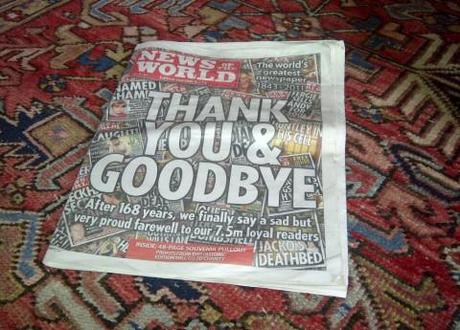
The final edition of The News of the World, which was shuttered after new hacking allegations came to light. Photo credit: Archie Thomas
Who watches the watchmen? That’s what the Leveson inquiry into press ethics, which began on Monday morning, hopes to determine. Prompted by the revelations that reporters had used private investigators to illegally hack into the voicemails of celebrities, politicians, and the families of victims of crimes, Lord Justice Leveson is conducting the hearings to examine the “culture, practice and ethics of the media”; witnesses will include alleged victims of phone hacking, such as the families of Madeleine McCann and Milly Dowler.
Leveson opened the inquiry Monday monring by stating that his aim is to establish “who guards the guardians”: “I fully consider freedom of expression and freedom of the press to be fundamental to democracy, fundamental to our way of life. But that right must be expressed with the rights of others in mind,” he said.
However, the inquiry itself has already come under fire from critics who claim that the panel is too narrow and not current enough, containing no one with experience in today’s news industry, James Kirkup at The Telegraph reported. “The danger is that newspapers are held to an impossible standard, a rose-tinted and unreliable memory of a bygone trade. Others suspect David Cameron and other politicians of hoping to use Leveson as a way to curb a troublesome Press: some MPs privately regard the inquiry as journalists’ just deserts for exposing their expenses.”
There’s also concern that the hearings won’t be robust enough and that its outcome will simply be a curtailment of press freedom. But has the UK press spun out of control?
Watch the hearings live.
No tabloids? Writing on a Guardian blog, Michael White said that an examination of press conduct was long overdue: “In hard times, we need a robust but more trustworthy press than ever, one whose economic stats can be trusted as well as their gossip columns,” he said. However, White also pointed out that the Leveson inquiry panel does not include any tabloid journalists, which may lead to accusations of unfairness.
Media witness. Writing for Channel 4 News, journalist Joan Smith explained that she agreed to give evidence to the inquiry after discovering that Glenn Mulcaire, the News of the World (NotW) private investigator at the heart of the phone hacking scandal, had recorded her personal details – even though she wrote a regular column for NotW‘s New International stablemate The Times. “I hope Lord Leveson’s inquiry will look at the buccaneering newsroom culture that allowed such extraordinary things to happen,” Smith said.
Press Complaints Commission. Meanwhile, the new commissioner of the Press Complaints Commission (PCC), David Hunt, announced a radical shake-up of the media regulatory body in The Times (£). The PCC came under fire during the phone hacking scandal, with Labour leader Ed Miliband branding the regulator a “toothless poodle” and Prime Minister David Cameron calling it “ineffective”. Tory peer Lord Hunt revealed that he was setting up a new regulatory body in addition to the PCC in order to create “a new structure that will include a body with teeth, a body with credibility”.
Self-regulation in danger? While many are welcoming the judge-led inquiry, others are worried that it could end the UK media’s practice of self-regulation,Bloomberg Businessweek reported. “It’s widely recognized that governmental interference in journalism is to be avoided,” PCC Director Stephen Abell, who has worked for the watchdog for more than a decade, told Bloomberg. “There’s a clear risk of statutory regulation affecting freedom of the press and freedom of expression.”

